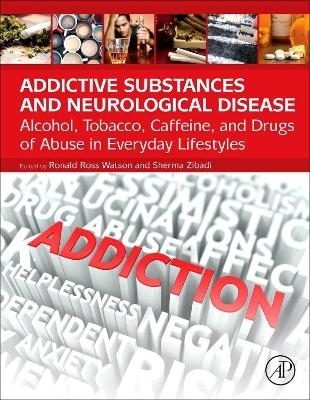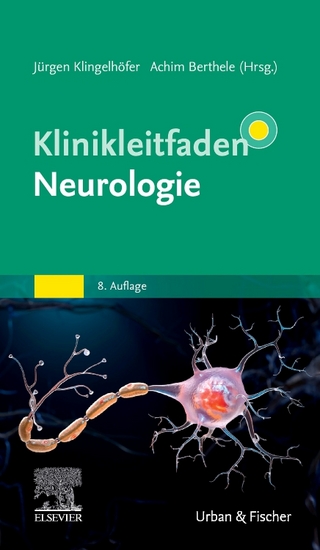
Addictive Substances and Neurological Disease
Academic Press Inc (Verlag)
978-0-12-805373-7 (ISBN)
Cannabis, cocaine, and other illicit drugs can have substantial negative effects on the structure and functioning of the brain. However, other common habituating and addictive substances often used as part of an individual’s lifestyle, i.e., alcohol, tobacco, caffeine, painkillers can also compromise brain health and effect or accentuate neurological disease.
This book provides broad coverage of the effects of addictive substances on the brain, beginning with an overview of how the substances lead to dysfunction before examining each substance in depth. It discusses the pathology of addiction, the structural damage resulting from abuse of various substances, and covers the neurobiological, neurodegenerative, behavioral, and cognitive implications of use across the lifespan, from prenatal exposure, to adolescence and old age.
This book aids researchers seeking an understanding of the neurological changes that these substances induce, and is also extremely useful for those seeking potential treatments and therapies for individuals suffering from chronic abuse of these substances.
Ronald Ross Watson, PhD, is Professor of Health Promotion Sciences at the University of Arizona, Mel and Enid Zuckerman College of Public Health. Dr. Watson began his research in public health at the Harvard School of Public Health as a Fellow in 1971 doing field work on vaccines in Saudi Arabia. He has done clinical studies in Colombia, Iran, Egypt, Saudi Arabia and the United States which provides a broad international view of public health. He has served in the military reserve hospital for 17 years with extensive training in medical responses to disasters as the chief biochemistry officer of a general hospital, retiring as a Lt. Colonel. He is a distinguished member of several national and international nutrition, immunology, and cancer societies. Dr. Watson’s career has involved studying many lifestyle aspects for their uses in health promotion. He has edited over 100 biomedical reference books and 450 papers and chapters. His teaching and research focuses on alcohol, tobacco, and drugs of abuse in heart function and disease in mouse models. Dr. Sherma Zibadi received her Ph.D. in Nutritional Sciences from the University of Arizona. Her medical degree and training were done at the Mashhad University of Medical Sciences. She then completed her post-doctoral research fellowship awarded by the American Heart Association where her research involved cardiology and complementary medicine studies. Her research has involved maladaptive cardiac remodeling process, which helps to identify new targets for treatment of heart failure. Dr. Zibadi’s research interest also extends into foods as medicines, exploring the preventive and therapeutic effects of dietary supplements on heart failure and its major risk factors in both basic animal and clinical studies, translating lab research findings into clinical practice. Dr. Zibadi is an author of more than 35 research papers in peer reviewed journals. She has been an editor on 8 scientific books like this one being proposed. She has edited on a variety of clinical topics: breast milk, bottle feeding, wheat and rice in health, polyphenols and health, omega 3 fatty acids, dietary supplements in immune modulation, and dietary fat and health. She and Dr. Watson have collaborated extensively on both laboratory research and editing.
Part I. Alcohol and Neurological Dysfunction 1. Acute Ethanol-Induced Changes in Microstructural and Metabolite Concentrations on the Brain: Noninvasive Functional Brain Imaging 2. Prenatal Alcohol Exposure and Neuroglial Changes in Neurochemistry and Behavior in Animal Models 3. Alcohol on Histaminergic Neurons of Brain 4. Antenatal Alcohol and Histological Brain Disturbances 5. Alcohol Intoxication and Traumatic Spinal Cord Injury: Basic and Clinical Science 6. Visual and Auditory Changes After Acute Alcohol Ingestion 7. Zebrafish Models of Alcohol Addiction 8. Effect of Alcohol on the Regulation of a-Synuclein in the Human Brain 9. Consumption of Ethanol and Tissue Changes in the Central Nervous System 10. Ethanol Consumption and Cerebellar Disorders 11. Gene Expression in CNS Regions of Genetic Rat Models of Alcohol Abuse 12. Role of TLR4 in the Ethanol-Induced Modulation of the Autophagy Pathway in the Brain 13. Ghrelinergic Signaling in Ethanol Reward 14. Alcoholic Neurological Syndromes 15. Frontal Lobe Dysfunction After Developmental Alcohol Exposure: Implications From Animal Models 16. Ethanol's Action Mechanisms in the Brain: From Lipid General Alterations to Specific Protein Receptor Binding 17. Antioxidant Vitamins and Brain Dysfunction in Alcoholics 18. Serotonin Deficiency and Alcohol Use Disorders
Part II. Addictive Substances and Behavioral Health 19. Functional Reorganization of Reward- and Habit-Related Brain Networks in Addiction 20. Ethanol: Neurotoxicity and Brain Disorders 21. Functionally Relevant Brain Alterations in Polysubstance Users: Differences to Monosubstance Users, Study Challenges, and Implications for Treatment 22. Deep Brain Stimulation: A Possible Therapeutic Technique for Treating Refractory Alcohol and Drug Addiction Behaviors
Part III. Tobacco Smoking in Neuromodulation 23. Understanding the Roles of Genetic and Environmental Influences on the Neurobiology of Nicotine Use 24. Tobacco Smoke and Nicotine: Neurotoxicity in Brain Development 25. Paradise Lost: A New Paradigm for Explaining the Interaction Between Neural and Psychological Changes in Nicotine Addiction Patients 26. Interactions of Alcohol and Nicotine: CNS Sites and Contributions to Their Co-abuse 27. Role of Basal Forebrain in Nicotine Alcohol Co-abuse 28. Chronic and Acute Nicotine Exposure Versus Placebo in Smokers and Nonsmokers: A Systematic Review of Resting-State fMRI Studies
Part IV. Drugs of Abuse and Brain Structure and Function 29. Novel Psychoactive Substances: A New Behavioral and Mental Health Threat 30. Cholesterol and Caffeine Modulate Alcohol Actions on Cerebral Arteries and Brain 31. Sleep, Caffeine, and Physical Activity in Older Adults 32. Ketamine: Neurotoxicity and Neurobehavioral Disorders 33. Left/Right Hemispheric “Unbalance Model in Addiction
| Erscheinungsdatum | 04.03.2017 |
|---|---|
| Verlagsort | San Diego |
| Sprache | englisch |
| Maße | 216 x 276 mm |
| Gewicht | 1430 g |
| Themenwelt | Medizin / Pharmazie ► Medizinische Fachgebiete ► Neurologie |
| Medizin / Pharmazie ► Medizinische Fachgebiete ► Suchtkrankheiten | |
| ISBN-10 | 0-12-805373-9 / 0128053739 |
| ISBN-13 | 978-0-12-805373-7 / 9780128053737 |
| Zustand | Neuware |
| Haben Sie eine Frage zum Produkt? |
aus dem Bereich


